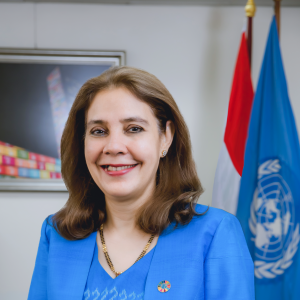I am pleased to join you as the moderator for these important discussions on sustainable food systems, which tie into the agenda of food security as a key national priority of the President for Indonesia.
Today’s event comes at a critical time for us to flesh out ideas ahead of the UN Food Systems summit later this month in Addis Ababa where governments will be discussing the scale of investments required to transform global food systems sustainably.
The Indonesian government, together with the UN, will be pitching solutions to the private sector about climate-smart agricultural practices.
These practices include lowering emissions, reducing environmental impacts, enhancing productivity, scaling up renewables and bolstering crops’ nutritional value via bio-fortification of seeds.
The private sector’s contributions are pivotal in all of these.
The UN’s Secretary-General stresses that “development is everyone’s business” and this is particularly true of food systems.
This means the private sector in Indonesia will need to pull its weight and the IGCN is an ideal platform for leveraging the sector’s commitment to sustainable food security.
Importantly, there is no one-size-fits-all solution and today’s dialogues provide us with an opportunity to hear from business leaders about their solutions to scale up organic farming, generate blue foods more sustainably and reduce emissions for their produce and across their supply chains, among others.
I would like our discussions to be pragmatic so we can learn from each other what works at scale and what doesn’t.
I am very much looking forward to having your insights.
Importantly, transforming Indonesia’s food systems is critical for greening the country’s entire economy while protecting its rich natural resources.
Out of the 37 million farmers around Indonesia, more than nine in 10 are smallholders and they play a crucial role in growing staple crops such as rice.
However, current agricultural practices are resource-intensive and result in high emissions with agriculture accounting for 7% of GHGs. Paddy cultivation alone is responsible for a third of these emissions.
At the upcoming food systems summit, Indonesia will showcase its strategy to scale up climate smart rice practices and biofortified rice seeds through the rice insurance scheme that reaches half a million small holder farmers.
This will involve a partnership with the private sector for a micro-lending scheme which will reduce emissions and enhance nutrition.
We also want to analyze the carbon footprint for rice production to better understand the emissions generated throughout the crop’s lifecycle.
This will enable us to understand at what steps can we cut back on emissions.
The results will inform policies from production to consumption.
All of this will require scaling up sustainable financing in partnership with investors to unlock capital for smart farming.
As the UN we are keen to work in partnership with the private sector to develop a fit for purpose framework for corporate level SDG bonds and green sukuks to support mobilization of capital.
Let me pause here and introduce my panel members.
Pak Jarot, national convener of Food and Agriculture BAPPENAS, an expert on sustainable food systems and I have to say, a master in multiple areas, including energy transition & climate change amongst others. I pick his mind frequently and most recently his advice helped us shape the SDG accelerator fund for Indonesia.
Pak Jarot, many thanks for joining us this morning. My question to you is what would you like private sector in Indonesia to do more of to accelerate sustainable food systems transformation agenda in country. And where would you like them to focus?
Ibu Nurdiana Darus, the Director of Sustainability at Unilever, it is a pleasure to have you join the panel as a representative of IGCN. Ibu Nurdiana has had the privilege of working with government, UN and the private sector – a unique combination – as you can look at issues from these three perspectives. My question focuses on Unilever and the best practices that you are binging to bear at scale in advancing sustainable food transformation with a focus on ESG and the supply chain. What is the one lesson that you believe can be replicated by SMEs in Indonesia?
Professor Damayanti Buchori is a leading figure in entomology and sustainability science in Indonesia. She is a faculty member in the Department of Plant Protection as part of IPB University. She is known for bridging academic research with policy and practical implementation, especially in food security, sustainable land management, conservation and ecosystem services. and agricultural development. My question to you is simple. Being an expert in sustainability science, what does Indonesia need to do to raise its game for sustainable food systems and what would you say is the quick win for advancing food systems transformation?
Finally, we have Ibu Marieska Widhiana, Head of Global Marketing, with United Family Food. Her experience with a big FMCG company is critical to the sustainable food systems agenda. Ibu Marieska, from your companies perspective and a representative of IGCN how UFF addresses issues of ESG, carbon footprint and SDGs corporately and with its supply chains?









